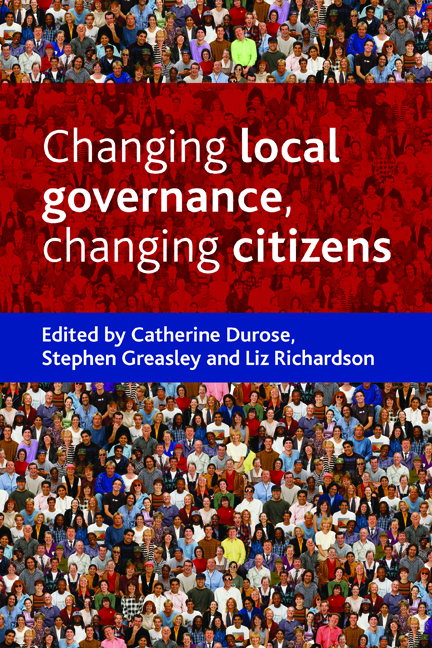Book contents
- Frontmatter
- Dedication
- Contents
- List of boxes and tables
- Acronyms
- Notes on contributors
- Acknowledgments
- Foreword
- Preface
- one Changing local governance, changing citizens: introduction
- two Citizen governance: where it came from, where it’s going
- three ‘Neighbourhood’: a site for policy action, governance … and empowerment?
- four Urban housing market restructuring and the recasting of neighbourhood governance and community
- five Citizen aspirations: women, ethnicity and housing
- six Can we promote cohesion through contact? Intergroup contact and the development of community cohesion
- seven New migrants, citizenship and local governance: ‘Poles’ apart?
- eight Citizens of faith in governance: opportunities, rationales and challenges
- nine Citizens’ reflections on behaviour change policies
- ten Every child’s voice matters?
- eleven e-citizenship: reconstructing the public online
- twelve Conclusion
- Index
ten - Every child’s voice matters?
Published online by Cambridge University Press: 16 July 2022
- Frontmatter
- Dedication
- Contents
- List of boxes and tables
- Acronyms
- Notes on contributors
- Acknowledgments
- Foreword
- Preface
- one Changing local governance, changing citizens: introduction
- two Citizen governance: where it came from, where it’s going
- three ‘Neighbourhood’: a site for policy action, governance … and empowerment?
- four Urban housing market restructuring and the recasting of neighbourhood governance and community
- five Citizen aspirations: women, ethnicity and housing
- six Can we promote cohesion through contact? Intergroup contact and the development of community cohesion
- seven New migrants, citizenship and local governance: ‘Poles’ apart?
- eight Citizens of faith in governance: opportunities, rationales and challenges
- nine Citizens’ reflections on behaviour change policies
- ten Every child’s voice matters?
- eleven e-citizenship: reconstructing the public online
- twelve Conclusion
- Index
Summary
Introduction
The publication of Every child matters (DfES, 2003) began a radical reform of children's services in England and Wales. The reforms were driven by concerns to improve child protection systems and children's outcomes, particularly among the poorest children. As a result children's services have undergone major institutional reform. Local education and social care authorities have been reorganised into ‘children's authorities’ and new structures seeking to improve accountability and interagency working have been introduced. Within these governance arrangements, authorities have been expected to involve children and young people (DfES, 2003), initially in terms of consulting service users and more recently in the ‘planning, commissioning and delivery of public services’ (DCSF, 2007).
This chapter examines children's participation in this service context. The terms ‘children and young people’ will be used interchangeably to refer to the age range targeted by the reforms (young people aged between 0-19 years old or up to 21-24 years in the case of looked after or disabled young people). The first part of the chapter reviews the drivers of change and national policy framework for reform and participation. The chapter will then examine the conceptualisation of children's participation and the implementation framework for reform drawing on theoretical and empirical work in this area. With several tensions between child welfare and children's participation agendas highlighted and a number of critical issues for local practice identified, the final section of the chapter examines change within a case study local authority. I argue that in this case there was evidence that children's involvement in local governance has not merely been tokenistic and has stretched beyond managerialist consultation. This was because children's participation was viewed as citizenship education and related to social inclusion and cohesion objectives in New Labour's communitarian approach. However, participation was not as yet ‘embedded in organisational cultures’ (Kirby et al, 2005) or leading to ‘shared child–adult agenda setting’ (Hart, 1992). The analysis seeks to demonstrate that, in the case of children's services reform, this is because of weaknesses in both the conception and implementation of children's participation. In thinking about the way forward there are tensions between current child welfare/children's participation agendas that need to be addressed as well as a number of factors curtailing local implementation.
- Type
- Chapter
- Information
- Changing Local Governance, Changing Citizens , pp. 175 - 192Publisher: Bristol University PressPrint publication year: 2009



